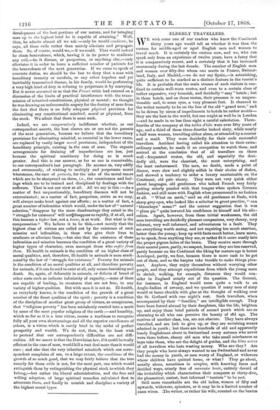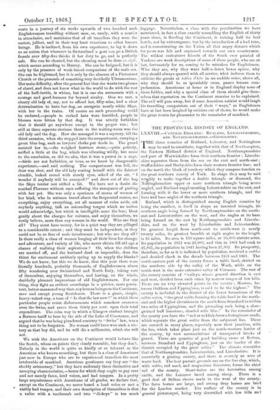ELDERLY TRAVELLERS.
WE wish some one of our readers who knew the Continent thirty years ago would tell us whether it was then the custom for middle-aged or aged English men and women to travel much. It is certainly the custom now, and we, who can speak only from an experience of twelve years, have a fancy that it is comparatively recent, and a certainty that it has increased enormously during the last decade. The number of English men and women over fifty-five whom one meets in France, Switzer- land, Italy, and Madrid,—we do not say Spain,—is astonishing, quite sufficient to be marked as a distinct feature in the tourist's life. It is probable that the main stream of such visitors is con- fined to certain well-worn routes, and even to a certain class of rather expensive, very homeish, and decidedly " easy" hotels ; but in those hotels, and on those routes, their presence is an unques- tionable and, to some eyes, a very pleasant fact. It chanced to the writer recently to be on the line of the old "grand tour," and to be driven by stress of impedimenta to hotels he rather avoids— they are the best in the world, but one might as well be in London —and he made in no less than eight a careful calculation. Three- fourths of the company at the tables d'hôte were over fifty years of age, and a third of those three-fourths looked sixty, while nearly a half were women, travelling either alone, or attended by a courier and a maid. They were decidedly for their ends successful travellers. Accident having called his attention to their extra- ordinary number, he made it an occupation to watch them, and arrived at the conclusion that of all travellers on those well - frequented routes, the old, and especially the deci- dedly old, were the cheeriest, the most enterprising, and the least embarrassed. The men, no doubt, made a point of dinner, were slow and slightly selfish in their choice of dishes, and showed a tendency to order a luxury unattainable on the Continent, old pale sherry. They were not very quick either about languages, old gentlemen who talked French very fairly getting utterly puzzled with that tongue when spoken German fashion, and still more with English when pronounced in no fashion at all. "What on earth," said an old gentleman at Basle, with sharp grey eyes, who looked like a solicitor in great practice, "can ' bloomboye ' mean ?" and the correct suggestion that it was "plum pie" quite lowered his confidence in himself and his edu- cation. Apart, however, from these trivial weaknesses, the old men travelling are decidedly pleasant companions, very cheery, very tolerant, very well informed, and adventurous to a fault. They see everything worth seeing, and not requiring too much exertion-, better than the young ; keep up with facts much better, learn more, so to speak, from anything they see, or rather fit it more neatly into the proper pigeon-holes of the brain. They receive more through their mental pores, partly, we suspect, because they are less reserved, partly because on the Continent the liking for mature age is better developed, partly, we fear, because there is more cash to be got out of them, and so the harpies take trouble to make things plea- sant. Anyhow, they enjoy themselves without worrying other people, and they attempt expeditions from which the young seem to shrink, walking, for example, distances they would con- sider in England utterly out of the question. The Gemmi, for instance, in England would seem quite a walk to an Anglo-Indian of seventy, and we question if many men of sixty would at home chuckle with glee at the thought of walking over the St. Gothard with one night's rest. Such travellers, when accompanied by their "families," are intelligible enough. They have been forced abroad by their daughters, like the life, brighten up, and enjoy those brief periods of second youth which are so charming to all who can perceive the beauty of old age. The motives of another class, too, are not obscure. They have always travelled, and are loth to give up, or they are revisiting scenes admired in youth ; but there are hundreds of old and apparently lonely Englishmen about in Switzerland every autumn who never were there before, cheery old men who take small mischances as boys take them, who are the delight of guides, and the bites noires of all travellers who hate wasting money. Who are they? Are they people who have always wanted to see Switzerland and never had the money in youth, or men weary of England, or widowers whose children have quitted home, or what ? They go about, usually alone, sometimes in couples, with knowing faces and decided ways, utterly free of mauvaise honte, entirely devoid of the irritability which characterizes their compeers at thirty-five, the pleasantest, easiest, best informed " tourists " to be met.
Still more remarkable are the old ladies, women of fifty and upwards, widowers, spinsters, or it may be in a limited number of cases wives. .The writer, or rather his wife, counted on the beaten route in a journey of six weeks upwards of two hundred such Englishwomen travelling without men, or, rarely, with a courier in attendance, and maintains that of all travellers they were the easiest, jolliest, and in their way least vexatious to other human beings. He is inclined, from his own experience, to lay it down as an axiom that wherever in Switzerland a goat can go a British female over fifty-five thinks it her duty to go, and is perfectly safe. She can be cheated, but the cheating must be done en rivle, which means according to Murray. She can be fatigued, but it is only by the presence of weak-kneed companions of the male sex. She can be frightened, but it is only by the absence of a Protestant Church or the presenie of something very decidedly Ultramontane. Her main difficulty, after the general fact that she wants two glasses of claret; and does not know what in the world to do with the rest of the half-bottle, is whims, but it is one she surmounts with a courage and good-humour far beyond rivalry. One we met, a cheery old lady of, say, not to offend her, fifty-nine, had a clear determination to have her dog, an energetic nearly white Skye, with her in the trains. Of course no such proceeding could be endured,—people in cocked hats were horrified, people in blouses were bitten by that dog. It was utterly forbidden that it should go anywhere except in the proper van ; but still at three separate stations there in the waiting-room was the old lady and the dog. How she managed it was a mystery, till the third occasion, when she stepped into the compartment, carrying a great blue bag, such as lawyers' clerks put deeds in. The guard assisted her in,—she weighed fourteen stone,—quite politely, sniffed a little at the bag, which was vibrating wildly, but came to the conclusion, as did we also, that it was a parrot in a cage, —birds are not forbidden, or hens, as we know by disagreeable experience,—and said nothing. The compartment was full, the door was shut, and the old lady seating herself with the faintest chuckle, looked round with steady eyes, asked of the air, "1 wonder if anybody will be annoyed?" and drew out of the bag the Skye terrier not stifled a bit. We have not a doubt she reached Florence without once suffering the annoyance of parting with her pet. She was only a specimen of scores of women of her kind, who in autumn travel about the frequented routes, see everything, enjoy everything, set all manner of rules aside, ask anybody anything, talk an astounding tongue which no nation would acknowledge, but which is intelligible none the less ; bleat gently about the charges for vultures, and enjoy themselves, we verily believe, more than any women in the world. Who are they all? They-must have money, for in a quiet way they are pillaged to a considerable extent ; and they must be independent, or they could not be so free of male interference ; but who are they all ? Is there really a class of women longing all their lives for change, and adventure, and variety of life, who never obtain till old age a chance of realizing their aspirations ? Or, when the children are married off, and the husband dead or impossible, does the thirst for excitement suddenly spring up to supply the blanks ? We do not know, but this we do know, that this year there were literally hundreds, probably thousands, of Englishwomen above fifty wandering over Switzerland and North Italy, taking care of themselves, enjoying themselves, and leaving, on the whole, decidedly pleasant impressions of old Englishwomen. For one thing, they fight an evident overcharge in a quieter, more persis- tent, better-mannered way than any human beings on the Continent, save and except young Scotchmen. There is a grave, simple, heavy-voiced way, a tone of "Is that the law now?" in which these particular people resist disbursements which somehow overawes even the Swiss, and saves them thirty per cent, upon their total expenditure. The calm way in which a Glasgow student brought a Bernese tariff to bear by the side of the Lake of Constance, and argued that he was being plundered contrary to "Swiss" law, was a thing not to be forgotten. No woman could have won such a vic- tory as thathoy did, and he will die a millionaire, which she will not.
We wish the Americans on the Continent would behave like the Scotch, whom on points they closely resemble, but they don't. Nobody in the world is quite so kindly or so tolerant as the American who knows something, but there is a class of Americans just now in Europe who are to experienced travellers the most intolerable of mankind. American gentlemen say they are "the shoddy aristocracy," but they have uniformly three distinctive and annoying characteristics,—boxes for which they ought to pay rent and not merely fares, loud voices, and bad tempers. In a pretty large acquaintance with Americans of all grades, we declare that, except on the Continent, we never heard a loud voice or met a , visibly bad temper, and their own description of themselves is that a valise with a toothcomb and two "dickeys" is too much I
luggage. Nevertheless, a class with the peculiarities we have mentioned, in fact a class exactly resembling the English of thirty !years since, is flooding the Continent, is ruining half its best hotels, not by extravagance, but by the introduction of a bad tone, and is concentrating on the Union all that angry distaste which for years was felt and expressed towards our own countrymen. The wildest caricatures friends of the South ever painted of Yankees are weak descriptions of some of these people, who are at last., fortunately for us, ceasing to be mistaken. fOr Englishmen. Who they are, why they want half-a-dozen boxes apiece, why they should always quarrel with all service, what induces them to criticize the guests at labks d'inite in an audible voice, above all, why they should be so ipvariably cross, passes human com- prehension. Americans at home or in England display none of those foibles, and why a special class of them should give them- selves that reputation on the Continent remains to be explained. The evil will pass away, but if some American satirist would laugh his travelling compatriots out of their " ways," as Englishmen have at last been laughed by satirists out of theirs, he would make the great routes far pleasanter to the remainder of mankind.



































 Previous page
Previous page